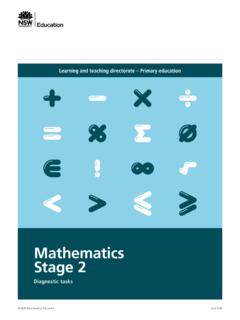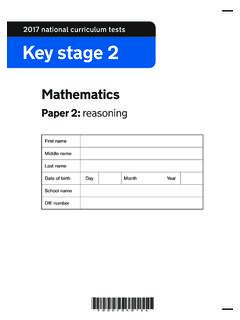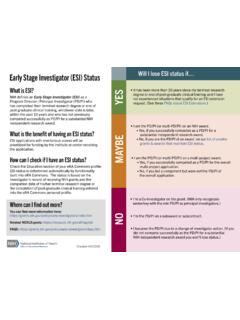Transcription of 2022 key stage 2 assessement and reporting arrangements
1 Key stage 2 assessment and reporting arrangements October 2021 2 Contents 1 Summary 5 About this guidance 5 Who is this guidance for? 5 Legal status 5 2 Changes for 2021/22 7 Performance tables in 2022 7 Multiplication tables check 7 The engagement model 7 Science sampling 8 Braille versions of the English reading test 8 Teacher assessment moderation training 8 Monitoring of local authorities moderation 8 Removal of D codes for KS2 teacher assessment 8 3 Important dates 10 Important dates for 2021 10 Important dates for 2022 11 Key stage 2 test timetable for 2022 13 4 Responsibilities 14 Headteachers responsibilities 14 Local authorities responsibilities 17 Teachers responsibilities 18 Governing bodies responsibilities 19 Academy trusts responsibilities 19 5 2022 national curriculum tests 20 Overview of
2 Tests 20 Scaled scores 21 Practice test materials 21 Test frameworks 21 Test orders 22 Modified test materials 23 Delivery of test materials 23 3 Security of test materials 24 6 Test participation 25 Participating pupils 25 Registering pupils for the tests 26 Access arrangements 28 Compensatory marks for the spelling paper 28 Pupils with English as an additional language 29 7 Test administration 30 Administering the tests 30 When to administer tests 30 Administering a test in multiple sittings on the scheduled day 30 Timetable variations 30 Absence during the test period 31 Making modifications to tests 31 Packing and collection of scripts 31 Monitoring the tests 32 8 Teacher assessment 34 Overview of teacher assessment 34 What teachers must assess 34 Teacher assessment frameworks 35 Pre-key stage standards 35 The engagement model 36 External moderation of teacher assessment 37 Submitting teacher assessment 38 Pupils who change schools 39 Standardisation and approval to moderate for local authorities 40 9 Marking and test results 41 Marking of the tests 41 Return of results 41 Return of test scripts to schools 41 Reviews of marking 42 How results will be used 42 4 10 Multiplication tables check 43 Overview of the multiplication tables check 43 Check participation 43 Administering the check 44 Headteacher s declaration form 44 Results 44 How results
3 Will be used 45 11 Maladministration 46 Maladministration of the MTC or KS2 tests 46 Maladministration of teacher assessment 46 12 reporting to parents 47 Annual reports 47 What reports must cover 47 13 Keeping and maintaining records 50 Pupils educational records 50 Disclosure of educational records 51 Transferring records to a pupil s new school 51 14 Legal requirements and responsibilities 53 How the arrangements apply to different types of school 53 Special educational provision 54 Regulatory concerns 54 15 Further information 56 Useful websites and links 56 Additional resources 57 General enquiries 57 Message us 58 Modified Tests 58 5 1 Summary About this guidance This guidance sets out the statutory requirements for key stage 2 (KS2) national curriculum assessment and reporting for the 2021/22 academic year.
4 It is produced by the Standards and Testing Agency1 (STA), an executive agency of the Department for Education (DfE) and is relevant until the end of the 2021/22 academic year. The assessment and reporting arrangements (ARA) apply to: maintained schools (including maintained special schools) academies (including free schools) alternative provision (AP) (including pupil referral units (PRUs), AP academies and AP free schools) secure units Ministry of Defence (MoD) schools participating independent schools with KS2 pupils Who is this guidance for? This guidance is for: all staff responsible for KS2 assessments, including administering the KS2 tests and the multiplication tables check (MTC) headteachers and senior leadership teams governors and trustees local authority ( LA) assessment co-ordinators Legal status The ARA contains provisions made in terms of Article 11 (as amended) of The Education (National Curriculum) (Key stage 2 Assessment arrangements ) (England) Order 20032.
5 The 2003 Order is made by the Secretary of State under powers provided for by section 87 of the Education Act 20023. This document gives full effect to the provisions made in the 2003 Order concerning KS2 assessment and has effect as if made by the 2003 1 2 3 6 Order. The ARA also contains guidance that does not form part of the law. Section 14 contains further information on legal requirements and responsibilities. 7 2 Changes for 2021/22 All existing statutory KS2 assessments will return in 2021/22, following their usual timetable. This includes: the end of KS2 assessments (including tests and teacher assessment) the year 4 multiplication tables check (see section 10) statutory trialling If any changes are needed due to unprecedented circumstances beyond STA's control, schools will be informed at the appropriate time, via the assessment update.
6 Performance tables in 2022 DfE has announced that school-level data from the KS2 national curriculum assessments will not be published in performance tables in 20224. Results will be shared securely with primary schools, academy trusts, LAs and Ofsted for school improvement purposes (see section ). Multiplication tables check From the 2021/22 academic year, the MTC is statutory for all year 4 pupils registered at state-funded maintained schools, special schools or academies (including free schools) in England (see section 10). The engagement model The engagement model replaces P scales 1-4 and is a new statutory teacher assessment tool for pupils working below the standard of the national curriculum and not engaged in subject-specific study.
7 It should be used to assess pupils learning regularly throughout the year, enabling these pupils achievements and progress to be measured over time. Schools must report to STA which pupils have been assessed using the engagement model when the pupil is at the end of KS2. This is so the DfE is aware of how many pupils are not engaged in subject-specific study and where they are being educated. 4 8 STA has published further guidance on the statutory requirements for using the engagement model5 to assess pupils working below the standard of the national curriculum and not engaged in subject-specific study. Science sampling There will be no science sampling in 2021/22. We will confirm arrangements for 2022/23 in due course.
8 Braille versions of the English reading test All KS2 tests are available in contracted braille. The English reading test will also be available in uncontracted braille, by request (see section ). Teacher assessment moderation training Online self-guided teacher assessment (TA) moderation training6 in English writing will be added to the Primary Assessment Gateway on Monday 1 November. These training materials are produced for LA moderators and will replace the face-to-face training that was previously delivered by STA to LAs each year. The training materials will stay on the Primary Assessment Gateway, with further materials being added in the 2022/23 academic year. The 2018/19 and 2019/20 standardisation training materials will also be available on the Primary Assessment Gateway for use if required.
9 We recommend that LAs select which, if any, of the materials they require to support training of LA moderators. The training can be downloaded and delivered by the LA or used as self-guided learning by LA moderators. Monitoring of local authorities moderation STA will no longer visit a sample of LAs during the moderation period to monitor their moderation processes and procedures. Removal of D codes for KS2 teacher assessment The D code, originally used to record where a pupil was disapplied from the national curriculum assessments, has been withdrawn for KS2 TA. 5 6 9 Further information on reporting TA and the codes covering the specific reasons for non-participation in the assessments will be published in the KS2 TA guidance.
10 This guidance is due to be updated on Monday 1 November. 10 3 Important dates These dates are subject to change. If any changes are needed due to unprecedented circumstances beyond STA's control, schools will be informed at the appropriate time, via the assessment update and on Important dates for 2021 Date Action Monday 11 October Access arrangements8 guidance published. Monday 25 October Forms available on the Primary Assessment Gateway9 for schools to: submit holiday dates place test orders (if required) notify STA of the LA selected for monitoring and moderation, applicable to: academies not using their geographical LA participating independent schools Monday 1 November Online TA moderator training on English writing added to the Primary Assessment Gateway.













